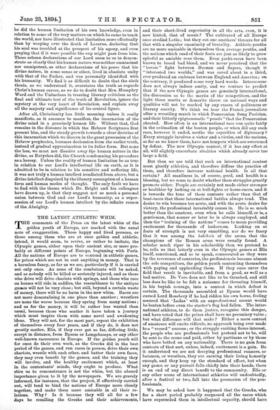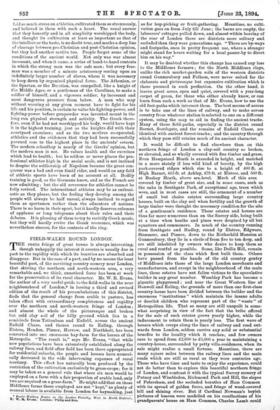THE LATEST ATHLETIC WHIM.
THE comments of the Press on the latest whim of the golden youth of Europe, are marked with the usual note of exaggeration. Those happy and tired persons, or those among them who are at once golden and athletic, intend, it would seem, to revive, or rather to imitate, the Olympic games, either upon their ancient site, or more pro- bably at different points of Europe, beginning with Paris. All the nations of Europe are to contend in athletic games, for prizes which are not to cost anything in money. That is a harmless fancy, as far as we see, particularly if it is carried out only once. As none of the combatants will be naked, and as nobody will be killed or seriously injured, and as those who drive will drive chariots with springs, and those who race on horses will ride in saddles, the resemblance to the antique games will not be very close; but still, beyond a certain waste of money, there will be no harm in the new whim. Races are not more demoralising in one place than another; wrestlers are none the worse because they spring from many nations ; and as for the money, it will be rather less wasted than usual, because those who scatter it have taken a journey which must inspire them with some novel and awakening ideas. They will not, for the most part, repeat the exhibition of themselves every four years, and if they do, it does not greatly matter, Ella, if they ever get so far, differing little, except in distance, from Epsom or Longchamps, or any other well-known racecourse in Europe. If the golden youth will for once do their own work, as the Greeks did in the best period of the games, and ran races in person, drive their own chariots, wrestle with each other, and batter their own faces, they may even benefit by the games, and the training they will involve, and the healthy excitement which, at least in the contestants' minds, they ought to produce. What stirs us to remonstrance is not the whim, but the absurd importance given to it by the newspapers. We are gravely informed, for instance, that the project, if effectively carried out, will tend to bind the nations of Europe more closely together, and make them more amicable in all their re- lations. Why ? Is it because they will all for a few days be recalling the Greeks and their achievements, and their short-lived superiority in all the arts, even, it is now hinted, that of music? The cultivated of all Europe once studied Latin; but they cut one anothers' throats for all that with a singular unanimity of brutality. Athletic youths are no more amicable in themselves than average youths, and the nations which read of their feats are just as likely to grow spiteful as amiable over them. Even yacht-races have been known to breed bad blood, and we never perceived that the " heroic " fight between Heenan and Sayers, though it "interested two worlds," and was raved about in a third, ever produced an embrace between England and America; on the contrary, it produced some very hard words. Intercourse does not always induce amity, and we venture to predict that if the new Olympic games are genuinely international, the discussion as to the merits of the competitors, and the light those merits or demerits throw on national ways and qualities will not be marked by any excess of politeness or literary suavity. We think we hear the French journalists after a wrestling match in which Pomeranian flung Parisian, and their bitterly epigrammatic " proofs " that the Pomeranian cheated. How often is an international race run quite fairly in the estimation of the beaten people, or when did any such race, however it ended, soothe the asperities of diplomacy ? Every struggle involves a victor and a victim, and the nations, so far as we know them, have not tempers which are sweetened by defeat. The new Olympic contest, if it has any effect at all, will slightly exacerbate rivalries which already cover too large a field.
But then we are told that such an international contest must glorify athletics, and therefore diffuse the practice of them, and therefore increase national health. Is all that certain? All manliness is, of course, good, and health is a blessing, but we seem to doubt whether these struggles greatly promote either. People are certainly not made either stronger or healthier by looking on at bull-fights or horse-races, and it is towards the tone of these contests rather than that of boat-races that these international battles always tend. The desire to win becomes too acute, and with the acute desire for victory, the professional invariably comes in. He is so much better than the amateur, even when he calls himself, or is, a gentleman, that sooner or later he is always employed, and then the "training of the nations" comes to mean providing excitement for thousands of lookers-on. Looking on at feats of strength is not very ennobling, nor do we fancy that it was among the habitues of the arena that the champions of the Roman arms were usually found. A scholar much riper in his scholarship then we pretend to be, tells us that latterly even in the Olympic games at Ella itself, sanctioned, and so to speak, consecrated as they were by the reverence of centuries, the professionals became almost the sole competitors, the golden youth contenting themselves with paying and applauding them. If they once enter the field that result is inevitable, and from a good, as well as a bad motive. De Vere does not like to be thrashed, and still less does he like to be felt a nuisance for thrusting himself, in his boyish courage, into a contest in which defeat is certain. The thousands assembled at Epsom would have cursed Lord Rosebery if he had ridden his own horse, feeling assured that ' Ladas ' with an unprofessional mount would be beaten before even the starter's flag had fallen. The inter- national athletes, to do them justice, recognise this danger, and have voted that the prizes shall have no pecuniary value ; but what difference will that make ? Either a mere contest of amateurs will excite ridicule, no approach being ever made to a "record" success ; or the struggle exciting fierce interest, the people who are professionals but pretend not to be, will be sent to the scene and paid, either by partisans or by those who have betted on any nationality. There is no gain from contests of that sort, unless, indeed, excitement is a gain. Be it understood we are not decrying professional runners, or batsmen, or wrestlers, they are earning their living honestly enough, and they keep up the standard of effort, but when any game, or any pursuit falls chiefly into their hands, there is an end of any direct benefit to the community. Elis or any other scene of international athletics will undoubtedly, after a festival or two, fall into the possession of the pro- fessionals.
We may be asked how it happened that the Greeks, who for a short period probably surpassed all the races which have superseded them in intellectual capacity, should have
I lid so much stress on athletics, cultivated them so strenuously, and believed in them with such a heart. The usual answer that they honestly and in all simplicity worshipped the body, and thought its cultivation at least as important as that of the intellect or the taste, is no doubt true, and marks a deep line of cleavage between pre-Christian and post-Christian opinion, but they had another motive too. People forget some of the conditions of the ancient world. Not only was war almost incessant, and when it came, a series of hand-to-hand contests in which the strong man was the safe man; but every free- man was a member of a minute aristocracy resting upon an indefinitely larger number of slaves, whom it was necessary
to keep down by organised physical force. The Athenian, or the Spartan, or the Bceotian, was compelled, like a knight of the Middle Ages, or a gentleman of the Carolinas, to make a soldier of himself, and a vigorous soldier, by incessant and most dangerous pressure from below. A man who may -without warning at any given moment have to fight for his life and his position, is certain to value his fighting-power, and fighting-power before gunpowder was invented meant in the long run physical strength and activity. The Greek there- fore, even if he had not worshipped his body, would have kept it in the highest training, just as the knights did with their courtyard exercises ; and as the two motives co-operated, athletics and the evidences that they had been successfully pursued rose to the highest place in the ancients' esteem. The modern schoolboy is nearly of the Greeks' opinion, but the modern man is not. He values health and the exercises which lead to health; but he seldom or never places the pro- fessional athletes high in the social scale, and is not inclined to despise the soldiership of Napoleon because the great con- queror was a bad and even timid rider, and would on any field of athletic sports have been of no account at all. Bodily training is good, as the Germans know, and as the French are now admitting ; but the old reverence for athletics cannot be fully revived. The international athletes may be as enthusi- astic as they please, but the feeling they develop among the people will always be half unreal, always inclined to regard them as sportsmen rather than the educators of nations. There is no harm in their sport, but it hardly deserves columns of applause or long telegrams about their rules and their debates. It is pleasing of them to try to revivify Greek music, but they will hardly revive the Greek reverence, which was nevertheless sincere, for the contests of the ring.



































 Previous page
Previous page